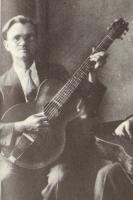 Dorsey Murdock Dixon was born in the mill town of Darlington, SC, in October 1897, the first son in a family that eventually numbered seven....
Dorsey Murdock Dixon was born in the mill town of Darlington, SC, in October 1897, the first son in a family that eventually numbered seven....
Leaving school in the fourth grade, Dorsey Dixon began his long career as a textile worker at the age of 12 in the mill where his older sister Nancy was already employed. Nancy had begun work as a spinner at the age of eight. She earned less than half a dollar a week....
Howard, Dorsey's younger brother... followed him into the mills at the age of ten and remained a fixer until his death in 1961. During World War I, both brothers were employed as signalmen on the Atlantic Coast Line Railroad. Laid off in 1919, they were forced to return to mill-work.
Two years after he began work, Dorsey started to learn the guitar; and about the same time he began to learn the violin... Later, when Howard was also playing the guitar, the brothers formed a fiddle-guitar duet and played at local functions around Rockingham, where the family were now living.
Surprisingly, it was not until he was 32 that Dorsey wrote his first song. This was "The School House Fire"... based on a Cleveland, SC, tragedy in 1923, in which 76 children died. Howard set the words to the tune of "Life's Railway To Heaven," and the brothers performed the song as a vocal duet. Realising that he had a talent for composition, Dorsey began to create the songs which so well reveal the feelings of a hard-working, God-fearing millhand.
fonte: MIKE PARIS, "The Dixons of South Carolina," Old Time Music 10, Autumn 1973, London, GB, p. 13.
http://www.folkarchive.de/dixon.html